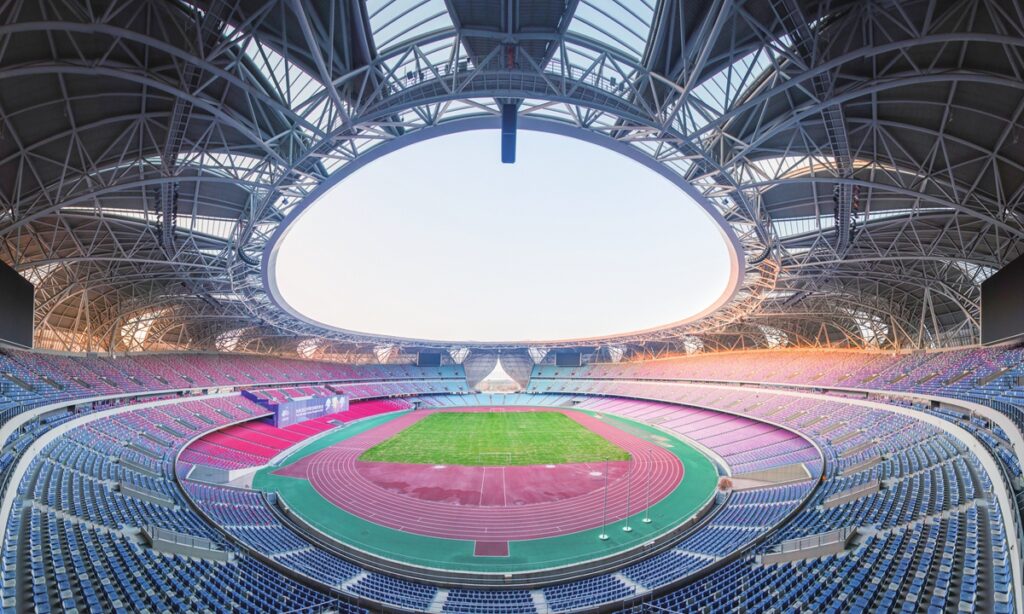Event shows China’s commitment to low-carbon growth
From green sporting venues equipped with wind, photovoltaic and other clean energy sources to technological applications including driverless buses and digital torchbearers, green technology has become one of the brightest spots of the upcoming 19th Asian Games, to be held from Saturday to October 8 in Hangzhou, East China’s Zhejiang Province.
Through the Games, Hangzhou’s green and high-tech development concepts will serve as models for other cities in China, which also show the country’s commitment to low-carbon and innovation-driven development, Chinese experts said.
Clean renewable energy has made green the premium color of the Games. At Zhejiang Power Exchange Center, the digital platform shows that green power used comes from the province’s offshore wind and photovoltaic installations, as well as the central and western regions including Northwest China’s Xinjiang Uygur Autonomous Region and Qinghai Province and North China’s Inner Mongolia Autonomous Region.
The 65 venues and related facilities of the Games have realized 100 percent green electricity supply.
Energy-efficient buildings also reflect the Games organizers’ attempt to put into practice the green concept when organizing the sports gala.
At the Hangzhou Olympic Sports Centre Aquatic Sports Arena, the intelligent light guide system can save 100,000 kilowatt-hours of electricity per year by introducing outdoor natural light into the arena through 210 tubes on the roof.
At the Fuyang Water Sports Center, a variety of green plants have made the arena’s greening rate reach 45 percent, which can capture carbon and release oxygen, and also make the arena warm in winter and cool in summer.

Hangzhou Asian Games
PowerChina said that the Beizhijiang Water Sports Center, built by the company, will be where the first gold medal of this year’s Asian Games will be awarded, according to a statement sent to the Global Times on Thursday.
The company noted that it helped the comprehensive improvement of the Beizhijiang River. Through the combination of venues construction and water conservancy projects, it plays an important role in realizing regional flood control, water quality improvement and development of the water economy.
The 19th Asian Games press conference announced on Thursday that the opening ceremony, which will be held on Saturday, will use green zero-carbon methanol for the first time. The fuel, which is regenerated from waste carbon, will be the fuel for the main torch tower, realizing zero emissions and helping create the first carbon-neutral Asian Games.
“The green elements to be reflected in the event show China’s achievements in its green transformation in recent years as well as the country’s responsibility and commitment to realizing its dual carbon goals,” Wang Peng, an associate research fellow at the Beijing Academy of Social Sciences, told the Global Times on Thursday.
As Hangzhou is one of China’s digital cities, intelligence has become a major feature of the Games.
According to the press conference, the opening ceremony will use 3D wire-guided technology in a large space for the first time, making the flame-lighting ceremony the first digital lighting ceremony with digital-substantive integration.
All venues are covered with 5G systems, new-energy charging piles and intelligent management systems, while the tournament will be broadcast in 4K ultra-high-definition, creating a new immersive viewing experience for spectators.
In addition, safe and smart driverless buses have entered the daily life of Hangzhou residents. The buses, equipped with a variety of automatic driving sensing equipment, such as vision cameras, can accurately sense the surrounding environment. They can also drive, and open and close their doors, all by themselves.
“The Games has promoted the optimization of the city’s energy structure and the intelligent transformation of its public transport and road facilities. It has led to the development of green and intelligent industries around Hangzhou,” Pan Helin, joint director of the Research Center for Digital Economics and Financial Innovation affiliated with Zhejiang University’s International Business School, told the Global Times on Thursday.
The event will demonstrate new models and ideas for urban management and public services in China, and it will promote the integration of the concepts and practices of green, low-carbon and sustainable development, Pan said.
(Global Times)




